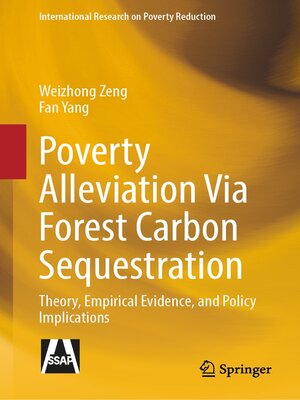Poverty Alleviation Via Forest Carbon Sequestration
ebook ∣ Theory, Empirical Evidence, and Policy Implications · International Research on Poverty Reduction
By Weizhong Zeng

Sign up to save your library
With an OverDrive account, you can save your favorite libraries for at-a-glance information about availability. Find out more about OverDrive accounts.
Find this title in Libby, the library reading app by OverDrive.



Search for a digital library with this title
Title found at these libraries:
| Library Name | Distance |
|---|---|
| Loading... |
This book focuses on two issues: the creation of benefits and opportunities for the poverty-stricken people and the trade-off between FCS and poverty alleviation. At the theoretical level, it explains the essential characteristics of PAFCS, analyses the impact mechanism of FCS projects in poverty alleviation, clarifies the stakeholders and their interests and demands, and delineates the dynamic mechanism of FCS projects and poverty alleviation. Based on this theoretical framework, the current situation and challenges for PAFCS in southwest China's ethnic areas are examined in depth. Project performance was quantitatively measured both for projects themselves and for community farmers. The research emphasises that FCS projects in poverty-stricken areas are not the same as PAFCS, highlights the combination of poverty alleviation theory and ecological compensation theory, and considers PAFCS as an intersection of poverty research and ecological compensation research. Additionally, theresearch suggested that FCS projects are not general poverty alleviation projects, highlights the need for full respect to be granted to the subjective will and value judgement of farmers, including poverty-stricken farmers, takes the lead in focusing on the win–win goal of combating climate change and reducing poverty, and makes a breakthrough in researching some key issues that need to be solved in the practice of PAFCS in the ethnic areas of Southwest China. This book is helpful for global scholars in the field of sustainable development, anti-poverty and forest carbon sequestration, government officials, and organisations in developing countries concerned with agricultural development, forestry economy, and sustainable development, as well as all the people around the world who want to find innovative solutions in the climate negotiations.







